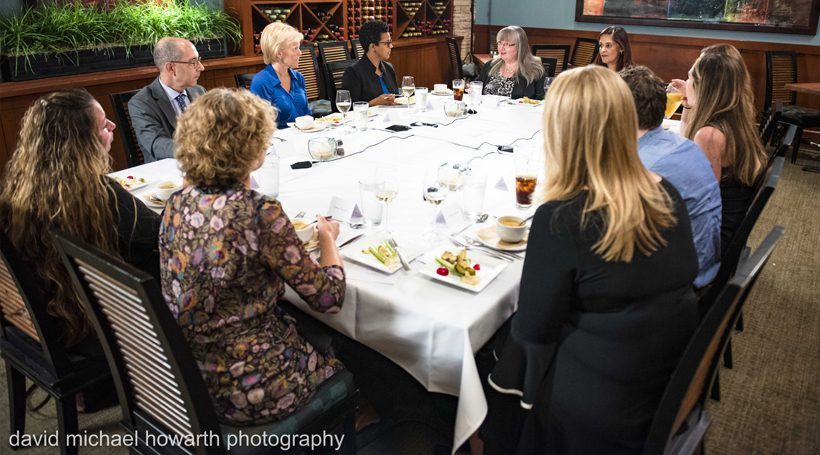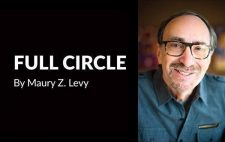Sponsored by Jefferson Health New Jersey
Photography by David Michael Howarth
To continue our popular roundtable series, we gathered 10 healthcare professionals for an in-depth discussion on the ever-changing field of women’s health. Many shared their similar experiences caring for women throughout the unique stages of their lives, and others reflected on the more challenging moments some women may live through. It was an interesting and inspiring evening.
Jason Franasiak, MD
Fertility Specialist, Reproductive Medicine Associates of New Jersey
Kate Wormser, CNM
Rowan Medicine
Charlotte Markey, PhD
Professor of Psychology, Rutgers University-Camden
Robin Wilson-Smith, DO
Medical Director, GYN Oncology Services,
Sidney Kimmel
Cancer Center Washington Twp./Jefferson Health NJ
Alka Kohli, MD
Executive Vice President/Chief Population health & Clinical Officer
Catherine Piccoli, MD
Women’s Imaging Specialist, SJRA
Nicole Lamborne, MD
Medical Director, Women’s and Children’s Services, Virtua
Jennifer Hummel, DO
OB/GYN, Jefferson Health NJ
Robin Perry, MD
Chairman & Chief, Cooper OB/GYN
Maurice Cairoli, MD
Breast Cancer Specialist, Regional Cancer Care Associates
 When patients make hard-to-understand choices…
When patients make hard-to-understand choices…
I have a hard time understanding when a woman knows she has a complex medical condition that gives her a 50% chance of dying, but she wants to continue with the pregnancy. I respect that decision, and I take care of patients who make those decisions, but I struggle with it. I have to work with them for a long time until I get to the place where I believe they really do understand they could lose their life while trying to bring another life into the world.
Robin Perry
A large number of my patients have life and death diagnoses, and they have the control. There are many times when I’ll have a young person say they aren’t taking chemotherapy. I have to accept that, and I have to make sure they know I’m still going to be there for them and be their advocate. I’ve learned as I’ve gone through my career that it’s not my job to have the control.
Maurice Cairoli
I have had patients with endometrial cancer who want to get pregnant. We complete their treatment, then send them to reproductive endocrinology once we have no evidence of disease. Then I hope they can get through a pregnancy, and that when they’re done, they’ll want to do their hysterectomy. I also hope the cancer doesn’t metastasize in the process. That’s how strongly they want a child. They’re willing to put their life on the line.
Robin Wilson-Smith
You have to really feel comfortable that the patient understands the risk they’re taking. You ask yourself, “Did I fail to really express the severity of this condition? Do they really understand what they’re choosing? Did I phrase it right? Did I say enough? Did they really, really understand?”
Nicole Lamborne
We delivered a 62-year-old woman who did IVF with donor eggs. She delivered at about 35 weeks and had a vaginal delivery. It was a complex pregnancy, she had a lot of complications, but in the end, healthy mommy, healthy baby. She has a 4-year old, and she wanted a sibling for that 4-year-old. Earlier in her life, she didn’t have a relationship that would lead to wanting to have a child with someone. Her husband is older, too, and they wanted to have this family that they thought they didn’t have the chance to have before.
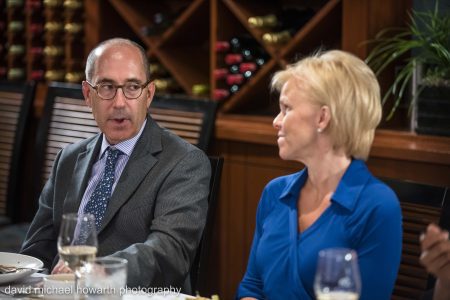 On obesity…
On obesity…
So much of what we do in America today is over a meal. We’re a social society. The obesity epidemic is going to be a tough problem to solve.
Maurice Cairoli
A lot of people don’t understand that soda is the leading contributor to obesity. If you could isolate one food product that has altered people’s weight the most, it’s soda. We have initial data from other countries and other cities suggesting people will drink less soda if we tax it, and they will weigh less. But people don’t like that. What we eat is very personal, and they don’t want to be told what they can and can’t put into their bodies.
Charlotte Markey
On aging…
The symptoms of aging can also be symptoms of a problem. For example, abdominal pain, back pain, some general GI issues can be symptoms of ovarian cancer. What’s hard is you have to differentiate between what is aging and what is a pathological issue. But I always believe what my patient tells me, that these symptoms are affecting her quality of life. I don’t necessarily jump to ovarian cancer, which is a good thing, but at the same time, that’s how some things are missed.
Kate Wormser
My patient population comes to me with a history of cancer. And everybody does have some degree of aches and pains. So it’s a very fine line to negotiate, because on the one hand I’ll say to my patients, “I don’t want to make you afraid to tell me something, because then you’re going to think, ‘Every time I tell him something, he’s sending me for a battery of tests.’” On the other hand, you don’t want to ignore what could be a problem. It’s a real fine line.
Maurice Cairoli
Aches and pains as you age are normal, but not preferable.
Catherine Piccoli
My motto is: Fight like a girl. There are so many things that can help us. If you think about osteoporosis, urinary incontinence, pain, menopausal symptoms, these aren’t things that should make us roll over and go “Ok, well, this comes with my age.” We have so much to offer women in those areas, and women should take advantage of it.
Alka Kohli
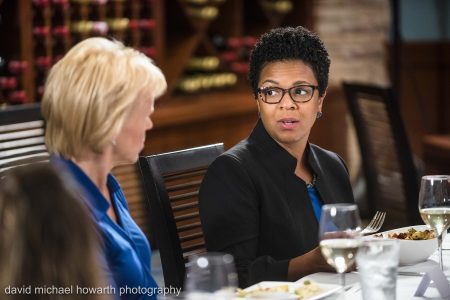 On how they advocate for women’s health…
On how they advocate for women’s health…
After our patients’ disease is either in remission or gone, the hospital provides something called survivorship. We talk to them about their risks and what they can do to prevent the cancer from coming back. A lot of my patients have endometrial cancer and they are over their ideal body weight, so we talk about diet. I recommend a plant-based diet. We also give a free gym membership for a month where they can work out and meet with a nurse and nutritionist. That’s one of the ways we’ve been able to impact women’s health.
Robin Wilson-Smith
At Cooper, we have a program called “A half day for health” for busy women who need to see their primary care doc, their OB/GYN and get their mammography done. They can make all of those appointments on one campus – usually our Voorhees campus – in a half-day session.
Robin Perry
On medical advancements in women’s health…
A while ago, patients would have these big, major surgeries where they’d be opened from stem to sternum. Now we’re able to perform surgery through tiny little holes with a robot. Recovery time is much better, there’s less blood loss, women are going home sooner and back to work sooner. If they do need treatment, it’s a lot easier to give chemotherapy or radiation when you have tiny little holes instead of a big abdominal incision that needs to heal. That’s pretty exciting.
Robin Wilson-Smith
HPV has been really transformative. We’ve come so far in being able to prevent cervical cancer with that vaccine.
Nicole Lamborne
In the world of infertility, genetic testing is a fairly large component of what we do, but much of the genetic testing is on the actual embryos. We are able to take a small, 5 to 8-cell biopsy of embryos and test for the full complement of chromosomes. We can then transfer only embryos which have the correct number of chromosomes. The pregnancy rate has gone up. The risk of miscarriage has gone down. This has revolutionized the way we practice.
Jason Franasiak
Robin Perry
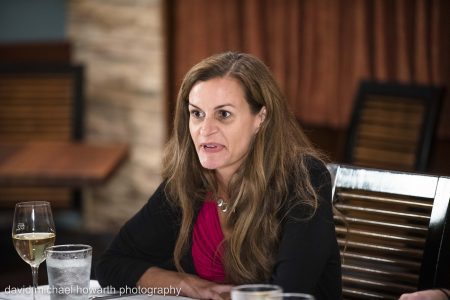 On infertility…
On infertility…
The success rates for infertility care have really skyrocketed. When IVF was first coming out, we were experiencing success rates in the single digits and now we have success rates for pregnancies in the mid-60s or low 70s.
Jason Franasiak
It’s really important for women to realize there might be absolutely nothing wrong with them or their partner. If there is a problem, there’s incredible help out there: everything from IVF to IUI to surrogates. We are very, very fortunate that technology has gotten as far as it has, and we have great providers who help us with that.
Robin Perry
On miscarriage…
If you understand the biology of conception and how an embryo develops into a fetus and then eventually is a perfect
little baby, it’s amazing the percentage of miscarriage is as low as it is. So much has to go perfectly right for a baby to come out completely normal, that it’s amazing it does so 95 to 98% of the time.
Robin Perry
A lot of times, women think, “It must have been me. It must have been something I inadvertently did,” or “If I could have done this, if I had stopped smoking, if I didn’t have that one glass of wine…” The mind just keeps wandering. It’s important for them to know it’s nothing they did, nothing they didn’t do.
Alka Kohli
We know a lot of what can cause a miscarriage, but we can’t always tell you what caused yours.
Nicole Lamborne
In the English language, if you lose your parents, you are an orphan. If you lose a spouse, you’re a widow. If you lose your child, you are… It’s so upsetting that we do not have a word for that.
Robin Perry
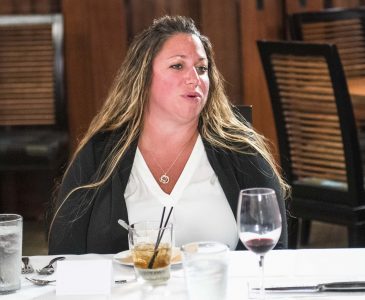 What frustrates them most about their jobs…
What frustrates them most about their jobs…
It’s not the long hours, it’s not the difficult conversations, it’s third-party payers. It’s no longer simple to be able to prescribe something for your patient. And what’s worse, when you get on the phone to have that conversation with somebody on the other side, they’re often not a clinician. They have this list of protocol. It is the most frustrating thing when you’re trying to be an advocate for your patient.
Alka Kohli
I have one insurance company that will not allow you to do anything for two weeks. I can have a patient walk in my office with cancer, and I cannot take her to the OR for two weeks. I cannot start the chemotherapy for two weeks.
Robin Wilson-Smith
Medicine was once a profession, but it’s truly a business now. There are barriers between providers and patients. It’s very difficult for the humanity to come through. For me, and I guess for a lot of us, that humanity is what attracted us to our various professions.
Maurice Cairoli
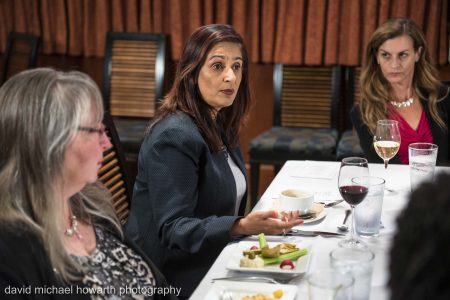 On relationships with their patients…
On relationships with their patients…
I get to take care of women in all stages of life – from catching them, watching them grow up, seeing them get their periods. Then they’re pregnant, and then you help them through menopause. I’m grateful I can take care of women in all of those different stages. I get to watch it all happen.
Jennifer Hummel
I love the humanity of being a physician, of being an oncologist. You develop long-term relationships. I have a patient who is 36, who I have known since she was 11 when she used to come into the chemo room and color while her mom was getting chemo. Now she has breast cancer, and she’s getting chemo. You develop strong relationships. I think life is relationships. Medicine is relationships.
Maurice Cairoli
About 60% of the patients I see each day are really just on a screen. But I have actually developed friendships with some of my patients. Of course, others tell me, “You’re wonderful, but I really never want to see you again.”
Catherine Piccoli
There’s something very unique about being a female physician and understanding a woman’s needs, because you know exactly what she’s talking about. You’ve been through some of that, and that bonds you together even more.
Alka Kohli
There is nothing more joyful than being part of a family’s life after they’ve had a loss, and you then see them have a baby they take home with them. Birth is always joyful, but there’s this thing: they understood how bad it could go. This family knows that, and they were brave enough and courageous enough to try, and they won in the end. This is a gift to me.
Robin Perry
I had a patient who had ovarian cancer, and I was with her for the toughest fight of her life. Now she’s raising money for our cancer center. So not only did she go through the fire herself, she’s reaching back into the fire to help others. If I ever was in that situation, I hope I could be just a third of what some of my patients are.
Robin Wilson-Smith
Women have a lot of the tools to take care of themselves. Doctors are not always the answer. We’re not the heroes.
Kate Wormser
On delivering babies…
I didn’t deliver any babies today. I caught four, but I didn’t deliver them.
Kate Wormser
There still is a valuable role for prenatal care. It’s not always about the testing. Take cats. I’ll ask a patient if she has cats. Yes? Well, you shouldn’t be changing the cat litter anymore. I educate them about something called toxoplasmosis, which is related to cats and can affect pregnancy. Sometimes there might be holes in a woman’s knowledge. That’s where good prenatal care has a place.
Alka Kohli
On medical advancements in women’s health…
The days where everybody gets a prescription based on a certain disease or disorder are going away. We are learning through genetics and other modalities that people react very differently to drugs, so there’s an opportunity to pick a medicine that is very specific to a person. So even within a certain disease, it’s not a one-size-fits-all anymore. That’s really exciting when you think about it.
Alka Kohli
One piece of advice for young women…
Stop hating your body. We all get one body, and it should be our tool for interacting with the world. Hate is not going to help.
Charlotte Markey
Be your own advocate. If somebody is not listening to you, find somebody who will.
Nicole Lamborne
Don’t let anyone tell you who you are or who you should be.
Catherine Piccoli
We all live in a very judgmental society. Women are judged to a much greater extent than men. You have to love yourself and accept who you are. That’s a lot easier said than done.
Maurice Cairoli
Focus on the triad: mind, body and spirit, and also trust your instincts. If you feel something is wrong, it is.
Robin Wilson-Smith
On what is surprising about women’s health…
What has surprised me more than anything is I never know what I’m going to hear from a patient behind that closed door. That is a privilege of the field we’re in, because patients will share things with you that, honest to God, they will not share with their mother or their friends or even their partner in life. I might be the first to hear it. That’s an awesome responsibility.
Alka Kohli
Women are willing to engage in all kinds of fad diets to lose weight, and there’s no support for what they’re doing. Those diets are often harmful and not helpful. It’s unfortunate, because it becomes a way of life.
Charlotte Markey
MENU
Seasons 52
Appetizer
Grilled Chicken Ravioli
Grilled Artichokes with Preserved Lemon Hummus
Summer Corn Soup
Entrée Choice
Southern-Style Shrimp & Grits
Chorizo, bacon, stone ground cheddar grits
Bistro Steak
Prime sirloin, roasted green beans, marble potatoes, red wine sauce
Dessert
Mini Indulgences


